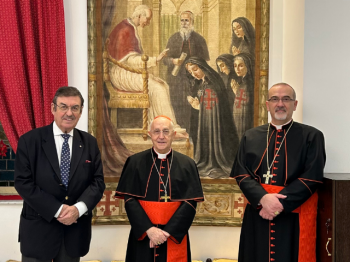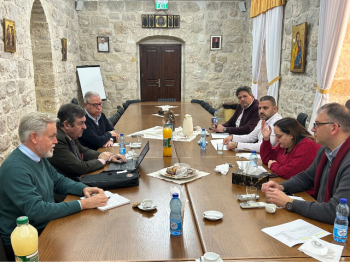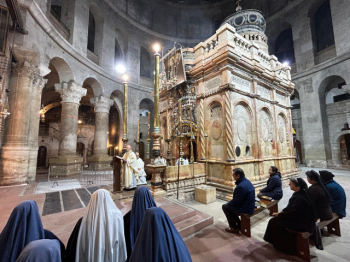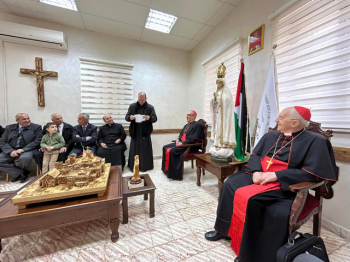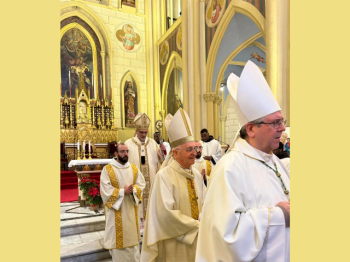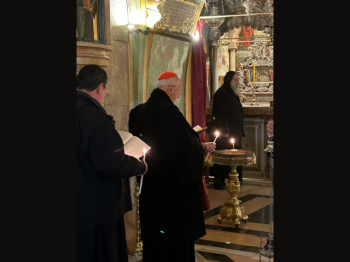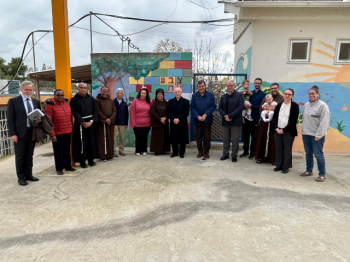"We made this trip at a time when the Holy Land is experiencing a period of solitude at an international level, with regards the absence of tourists and pilgrims who usually go here, especially at this time of year, to Jerusalem, Bethlehem and other places. While the silence caused by the absence of pilgrims is particularly evident in the streets of this ancient city, the Governor General and I thought it would be useful to show our closeness, our solidarity and offer our help in the face of such a reality of lack of pilgrims and visitors, which is also reflected in an economic crisis. We think of all the people who no longer have jobs, who have been laid off, families who no longer have an income....
Given our vocation to the Holy Land, it seemed appropriate for us to be present here today, also in view of the 57th World Day of Peace, while the Pope calls us every day to peace. To be here, in the context of this celebration desired by Paul VI, seemed to us the best way to reiterate, also to our Knights and Dames, that we do not forget at this moment the Holy Land, the Patriarchate, its needs, its works... that is precisely why we came.
I must say that we really enjoyed this trip, which took place in a particularly special atmosphere. We experienced the isolation of these places, especially when we walked along the empty Stations of the Cross, without anyone. This is particularly evident in a city with such a personality; the soul of Jerusalem is very peculiar, like that of the Holy Places, because of the presence of pilgrims. Pilgrims give life; pilgrims are life. When the pilgrims are not there, what remains is the structure, like a beautiful shell that lacks something: life.
And in a way, we wanted to say to those who want to go here: Courage! It is possible to come; it is possible to be present. We are not politicians who can give the guarantees that a state and security obviously require, but in light of what we have seen, what we have experienced, the way we have been received, we think it is possible for Jerusalem and the Holy Places to come alive again.
We visited some very poor families, really poor families, families who are not only poverty stricken but who do not even have jobs at the moment, as they live off the income from tourism-related activities. This is very relevant because these Christian families that we visited, who live in poverty, and who in a sense represent a stable presence in the Holy City, find themselves, if there is no support, if there is no help, in an extremely difficult condition. This is with regard to the first aspect.
Another aspect was the fact that we were able to converse and meet people who experienced the trauma of October 7 and the subsequent tragedies. We were able to talk to people who were closer to the Jewish world and therefore experienced more intensely the trauma, the enormous, unspeakable, unacceptable massacre of October 7, but we also felt that for so many families it was impossible to get out because of the destruction.
The pastor in Gaza was extraordinary: he accompanied us, he organized our visits, he mediated, so to speak, in the Holy Places, but he also made us experience the reality of Gaza, through the permanent ties he maintains with Gaza. We did not go to Gaza, but in a way we went to Gaza. And we were also happy to see how the few pilgrims present gave a "deep sense of prayer." It almost seemed that, in the silence, our prayer was stronger, more alive.
Not only did we visit the Holy Places, the Basilica... but, in Bethlehem, we were also able to sit alone in the grotto. We were alone. Very few people were sitting there, praying in silence. This sense of prayer was also very beautiful, very powerful.
There are other moments that we shared with the brethren in the Basilica, but also in the parish that we visited in Beit Sahour: a beautiful presence, and this presence was that of a somewhat sad celebration, a celebration that should not disappear but that carries in its heart the traces of this parish reality.
There are so many aspects that we were able to capture. And then there is the affection of all those people who need our presence."
